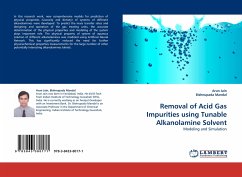The control of crystal morphology in industrial crystallization is critical because it significantlyaffects the efficiency of downstream processing (filtering, washing, and drying) and postprocessingphysicomechanical properties (bulk density, wettability, and tableting behavior). Inthe case of pharmaceuticals, crystal morphology affects drug bioavailability and thus itstherapeutic efficacy. Factors such as cooling rate, degree of supersaturation, agitation speed,agitation time, presence of seed crystals, and impurities have been routinely used to engineercrystal morphology.The first task was to derive quantitative solvent indices for tuning the crystal morphology. Thiswas achieved by conducting series of systematic and comprehensive cooling-crystallizationexperiments. The roles of inter- and intra- molecular hydrogen bonding, steric hindrance resultingfrom solvent functional group position, and aromatic pi-intermolecular interactions, indetermining the final crystal form were examined. Several organic solids, includingpharmaceutical compounds such as ibuprofen and aspirin, were crystallized from solvents withwidely varying polarities.
Bitte wählen Sie Ihr Anliegen aus.
Rechnungen
Retourenschein anfordern
Bestellstatus
Storno








